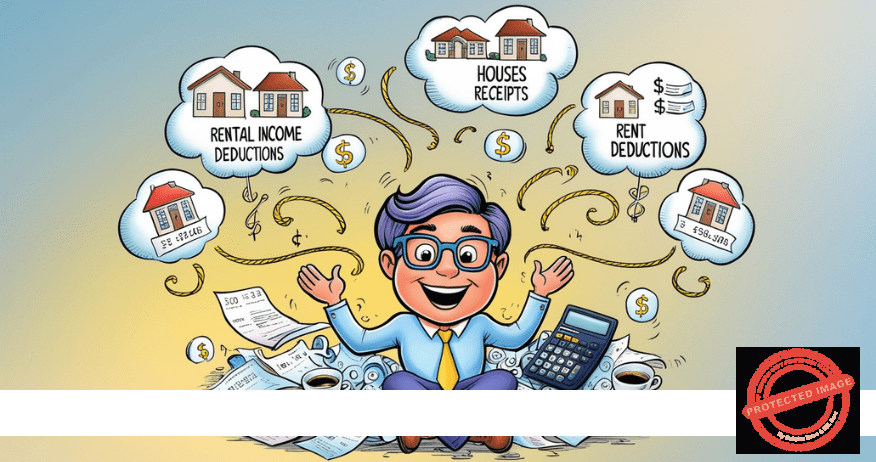There are deductions for rental income allowed by the government. This post will discuss the top fifteen tax deductions for rental income so that the rental income owners can pay the correct amount of income tax for their rental business.
a. Affiliate Disclosure: These are affiliate links from which we receive a commission at no cost. Read the full Affiliate marketing disclosure HERE.
b. Tax Contents Disclaimer: The tax industry in Kenya is very dynamic. The tax contents in the posts are not professional advice. Read full disclosure HERE.
In the principle of tax fairness, taxable income earners are expected to pay only the correct amount of tax. The Income Tax Act allows deduction of expenditure incurred towards generating taxable income.
Therefore, to establish the correct amount of income tax to pay, the expenses incurred towards the income generation are deductible.
Landlords earn rental income in the rental business. The income may be from own rental premises or rented premises where the landlords are subletting. Rental income is one of the incomes subject to income tax. Hence, to establish the correct amount of tax to pay, every landlord has the right to deduct the expenditure incurred towards generating the income.
Only landlords paying rental income tax under standard Income tax provisions can claim expenditure towards generating taxable income. For taxpayers who pay tax under minimum rental income provisions at the current tax rate of ten percent, they do not claim any expenditure.
Rental income tax is due from all rented properties unless expressly exempted in the Income-tax Act. Some of the income that attracts rental income tax are incomes from the rental of residential houses and buildings, commercial houses and buildings and others.
Many landlords spend money operating the business of rental properties. However, many landlords pay more taxes on their rental income than they should. Many landlords do not deduct expenses used to generate the rental income.
There are reasons why landlords do not deduct expenses used to generate the rental income. For example the landlords does not know that the tax law allows them to deduct expenses when establishing taxable rental income.
The following are seven tax deductions that are discussed in this post that every landlord must consider when establishing the amount of income tax to pay for rental income.
1. Landlord salary
Every service provided towards the generation of taxable income should be accounted for and paid for. However, many landlords offer services towards the generation of rental income, and they do not charge for the services. It remains a mystery why many landlords feel sufficiently philanthropic and do not charge for the services they provide in their rental business. Landlord salary is tax deductible.
2. Employees Compensation
No business can operate without employees. Some rental businesses have several permanent and temporary employees. There are expenses incurred for the permanent and temporary employees. The expenses are in salaries, wages, or allowances for any person to provide employment services for the rental businesses. The expenses are deducted as rental business expenses
Tax Deduction 3. Training expenses
Landlords and their employees may attend training, seminars, and conferences to improve business skills. The attendance of the training, seminars, and conferences may be in person or online. In addition, the attendance may also be local or away in another town.
Tax Deduction 4. Professional services
Landlords procure a lot of professional services for the generation of rental income. Some of the professional services procured by landlords for the rental business are legal services, accounting services etc.
5. Transport costs
Landlords travel to their rental properties to sort out several issues concerning the properties. The landlords are entitled to a tax deduction when they incur costs to travel for their rental business matters.
For example, when the landlords travel to sort out a tenant complaint, a meeting, to inspect the properties, or to the hardware stores to purchase supplies for repairs of the rental properties, they incur transport costs.
6. Office Expenses
Many landlords have rental business offices, either at home or elsewhere. There are expenses incurred to operate the rental business offices. The landlords have a right to deduct office expenses from their taxable income.
The deduction applies to the office space and any workshop or other home workstations where the rental business is operated from. Some of the expenses incurred in an office for rental income are rent for the space, office stationery, internet bills and others.
Tax Deduction 7. Interest expenses
Many landlords borrow loans for their business of rental properties, and they pay interest on the loans. Landlords borrow loans and pay interest in three instances interest on loans to build rental properties, and mortgage interest on loans used to acquire, renovate or modify rental properties.
Conclusion
Note that these are not the only expenses. There are many other expenses. Did you learn anything new? Implement what you have learnt.
This post was on tax deductions for rental income.
We trust you have learnt something. We would love to hear from you. Send any questions or messages to us using the form below …
Thank you for reading the post.
Dr. Wakaguyu W. K
Remember to visit the e-Store for books HERE












